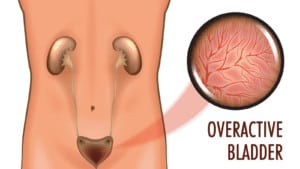Urinary incontinence affects millions of women across the globe, but it is most prevalent in women older than 50. Urinary incontinence is the leaking of urine during normal daily living activities or in having to urinate without warning urgently. This problem can be acute or chronic. A urologist has offered suggestions for women who are experiencing this common, yet debilitating problem.
What Causes Urinary Incontinence?
There are many causes of urinary incontinence, but the main one is age. Older women who are experiencing menopause are more likely to experience this issue. Previous childbirths or general wear on the body makes the body weaker and not as efficient at holding in urine. In some cases, recent pregnancy and childbirth can temporarily weaken the organ and lead to urine leakage.
Some women find that the urge to urinate strikes so suddenly that they don’t have a chance to get to the bathroom in time. This situation can cause distressing and embarrassing leaks if the condition isn’t treated effectively.
The condition can also be caused by underlying medical conditions that are highly treatable. These include, but are not limited to:
Urinary tract infections
These infections can irritate the body and lead to leakages. When you talk to your doctor about your symptoms, this is one of the first things that he or she will check.

Constipation
If you are frequently pushing and straining to have a bowel movement, it can weaken the pelvic muscles, leading to leakages. Treating constipation often solves the problem without further intervention.
Hysterectomy
Any surgical procedure that affects a woman’s reproductive system can cause urinary incontinence. This can be a temporary condition immediately following the surgery or an ongoing condition.
Obstruction or tumors
Tumors in the body can block the pathways in the urinary tract. These blockages can cause overflow and leakage problems in both men and women.
Neurological disorders
sometimes the problem is caused by the signals not making their way from the brain to the organs correctly. Conditions like Parkinson’s disease, Alzheimer’s, strokes, spinal cord injuries or brain tumors can lead to the involuntary release of urine.
Family history
If your mother suffered from this common condition, the odds are higher that you will also suffer from the same leakages. Your doctor will likely take a family history to find out if the condition is hereditary.
The Four Basic Types of Urinary Incontinence in Women
- Stress– this type occurs when you sneeze, laugh, lift heavy objects or exercise
- Urge–this type occurs when you leak urine after feeling the intense, sudden urge to urinate. Also called overactive bladder, this can happen even at the sound of running water
- Mixed–this is when you have stress and urge incontinence at the same time. This happens more frequently with women than with men
- Functional–this is when another condition makes it impossible for you to get to the bathroom in time. Many people with mobility problems suffer from this common form

When to Seek Medical Advice
Women should seek medical advice any time they start to see symptoms of the condition. In some cases, incontinence can be caused by an infection. Untreated infections can cause a variety of problems that can have long-term consequences.
Your general practitioner can diagnose the condition either through a short interview or a pelvic exam. The doctor may also ask you to keep a diary of your symptoms, keeping track of each time you experience leakage or urgency. You may also be asked to keep track of your food and liquid intake.
Your doctor may suggest lifestyle changes like schedule training, pelvic floor exercises, and changes in weight and diet. They may also indicate the use of pads and other aides to deal with leaks.
Techniques for Women to Deal With Urinary Incontinence
1 – Schedule Training
One of the ways to prevent urinary leaks is to use the bathroom at the same time each day. Instead of waiting for the feeling of the urge to go, you proactively use the restroom, gradually training your body to go longer between trips to the bathroom.
2 – Kegel Exercises
Often used by women to prepare for the birth of a child, Kegel exercises can help stop the flow of urine and strengthen the bladder. Urologists encourage women to perform these exercises several times daily.
1. Get a feel for the pelvic floor muscles by stopping your urine mid-stream. Squeeze the muscles tightly and release them.
2. When you are not using the bathroom, squeeze your pelvic floor muscles for five seconds and release. Doing one cycle of this counts as one rep. Do three sets of 10 of these daily.
3 – Cut Back on Caffeine
Drinking large amounts of caffeine can worsen urinary leakage. Caffeine can irritate the bladder, making it more likely that you will have problems holding urine. Coffee, sodas, green tea, energy drinks, and hot cocoa can aggravate the condition. Cutting back on these high caffeine drinks can help to ease the symptoms and stop the leakages.
4 – Stop Smoking
Smoking can weaken the muscles of the pelvis, leading to incontinence. Excess coughing that often accompanies smoking can reduce the muscles and make it more likely that you will experience leakages.
5 – Lose Weight
Excess weight can put pressure on the pelvic floor, making it weaker and more susceptible to leakage. By losing weight, you will release this pressure and start to see a reduction in the incidences of leakages. Even a small amount of weight loss can go a long way in stopping this bothersome problem.
6 – Drink More Water
Many people who suffer from this condition avoid drinking water out of fear that it will make the situation worse. In reality, the opposite is exact. Not drinking enough water will make the organ smaller, which means that you will be more, not less likely to hold urine. Drinking eight glasses of water per day will help to ease the symptoms and alleviate the problem.
7 – Avoid Acidic Foods
Acidic foods can irritate the lining of the organ, making it more likely that you will suffer from leakage. Foods like tomatoes, oranges, lemons, curries, and grapefruit can all worsen the condition.
8 – Get Exercise
Engaging in regular exercise that strengthens the core and the pelvic muscles is an excellent way to ward off the symptoms of this inconvenient condition. Activities like yoga, Pilates, and core training will help you to alleviate the pressure that can lead to leakage. It will also strengthen the muscles to help you to stop the flow of urine before leaks happen.
9 – Stop Drinking Late at Night
Cutting out all liquid after 6 p.m. will help to prevent the urge to urinate throughout the night. Many women will find themselves getting up frequently during the night to use the bathroom, which can interfere with sleep. By cutting out all liquids late in the evening, you can avoid this sleep interruption.
10 – Purchase the Right Products to Help With Leakages
If you are dealing with this condition, you may often find yourself with wet clothing. Many women use absorbency products like waterproof pants or pads to catch leaks. Some women are outfitted with catheters that catch urine before leaks happen.
Some women use tampons to stop the flow of urine, although urologists do not widely recommend this. Doctors also do not support the use of sanitary napkins as these products are not formulated for urine leaks. They may trap urine closer to the skin and cause skin irritation.

Final Thoughts: Talk to Your Doctor About Urinary Incontinence
Many women are reluctant to talk to their medical professionals about this common problem. If you are pregnant or have recently given birth, understand that this happens to most new moms. Your doctor or nursing professionals deal with these issues daily and are glad to talk to you about how to solve the problem.
Women who are going through menopause often visit their doctors for other gynecological issues, and this is an excellent time to bring up the problem. Again, your medical professional is used to talking about this issue with other women, and they will treat you with dignity and respect.
The worst thing you can do when faced with this condition is to ignore it. In older adults, racing to the bathroom can lead to falls that can, in turn, cause serious injuries. Dealing with this problem can also limit social interactions as many women are afraid of unplanned leaks while out in public or with friends. Finally, this condition can also be a symptom of a more severe issue, and ignoring it can lead to worse health outcomes.
When it comes to dealing with urinary incontinence many causes can lead to the condition. Most of these causes can be easily treated with lifestyle changes and don’t require major surgery or ongoing medication. Many women suffer from leakages, but they do not have to be an inevitable part of the aging process. By identifying the source of the problem, taking steps to alleviate the condition, and talking to your doctor and other medical professionals, you can enjoy a life free of embarrassing and inconvenient leaks.
The post Urologist Shares Tips for Women Suffering From Urinary Incontinence appeared first on Power of Positivity: Positive Thinking & Attitude.
【Top 10 Malaysia & Singapore Most Beautiful Girls】Have you follow?
